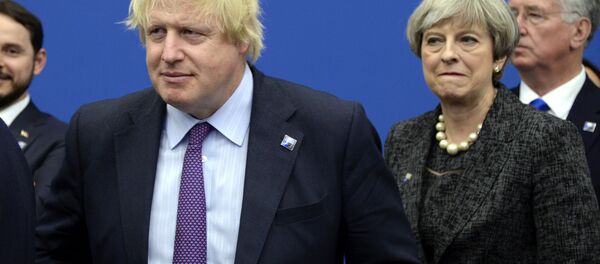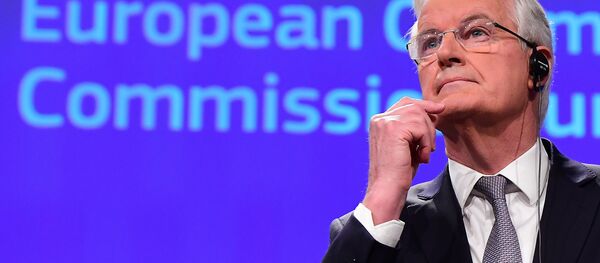Sputnik discussed the disagreements between the Brexiteers and the Remainers in the UK with Iain Begg, professor at the European Institute of the London School of Economics and Political Science.
Sputnik: What is the latest in the sort of fight between the Brexiteers and Theresa May? Why are they so opposed of the customs partnership; and what do you think Theresa May will be able to suggest to counter this?
Iain Begg: The reason is that the promises around leaving the European Union are now having to be made specific, where they've been able to be obfuscated before now. Leaving the customs union and leaving the single European market were what Theresa May set out consistently in her various speeches at Lancaster House 18-15 months ago, in Florence last autumn, and again earlier this year.
READ MORE: Eurozone Growth Slows Down as EU Unveils Post-Brexit Budget Plan
But leaving the customs union is unpopular with business; business thinks we are strongly linked to the European Union, we don't want to put obstacles in our way, particularly, with supply chains, supply networks, and there's also the element of Northern Ireland, where in the absence of a customs union there would have to be some kind of border on Ireland, how hard it is, is a second order question, just having the border would be difficult for the Belfast Agreement which solved the problems of Ireland 20 years ago.
So that's the dilemma that Theresa May faces, she has had a lot of pressure from business and elsewhere to do something else, which is staying in the customs union, and the concern that if you stay in the customs union, you're, in fact, more or less staying in the European Union, which would upset the Brexiteers.
Another survey for the website Left Foot Forward found that 57% of Brits said that the UK should remain a member of the customs union, only 16% saying that they wanted to leave, and it's just very interesting to note that during the run-up to the Brexit vote, nobody really talked about the customs union or the single market, and staying in or out of that.
There was talk about a lot of other things, and it seems quite strange or paradoxical that, apparently, if you trust these polls, that most Brits would like to stay, not just the businesses, but most Brits would like to stay in the customs union and also in the single market.
Iain Begg: At the risk of sounding patronizing towards my fellow citizens, I think the question that's not asked in these surveys is — what is the customs union and do you understand it — because a customs union is for economists a straightforward term, it means that you have no controls on exchanges of goods between your countries.
READ MORE: 'Betrayal': UKIP Founder Explains Reasons Behind House of Lords' Brexit Decision
But it also means that you have to have a common position towards the rest of the world, the European Union's position towards Russia, position towards China, position towards the United States, but all 28 members of the European Union have to agree to it. Turkey is in a partial customs union with the European Union covering manufactured goods, but not agricultural products, and that means that Turkey has to accept any deals that the EU does with third countries and has no say in that.
I would query how deep the understanding is among those you cite in this polling evidence of what a customs union entails. But another part of it is that the Brexit promise was that Britain would then be free to do trade deals with the rest of the world, and if you stay in the customs union you cannot deliver that, and it doesn't really matter if you talk about customs arrangements, A customs union rather than The customs union, which has been part of the British discourse on this, the fundamental fact is — having a customs union with the EU stops you doing trade deals with the rest of the world.
Iain Begg: I think this is coming down to a real contest about the extent to which Britain wants to distance itself from the European Union. The pro-Brexiteers that you cited in your introduction clearly say "we want to make a clean break," and that remains the official government position, but there's been a huge pressure to soften it and to have something in between. In negotiations, it is very often the case that you say take the two extreme positions and split the difference, take the position in the middle.
I happen to think, although I would favor remaining in the European Union, that the in-between option will be very uncomfortable for everybody. It doesn't satisfy the Brexiteers, because they're not free to do trade deals with the rest of the world, nor will it really satisfy the pro-Remain people in the UK, because Britain would then become a rule taker rather than a rule maker, it's like Norway, although not part of the customs union, is in the single market and, broadly speaking, has to accept the rules of the European Union dictates to it, and that's not the position that Britons will feel themselves very comfortable with.
READ MORE: Support for Ireland's Exit From EU May Grow Amid Brexit Talks — UKIP Lawmaker
So I think we're reaching a crunch point in the whole Brexit debate about what form of Brexit we tolerate, and having to think through the ramifications of it not just for the immediate vote, but for significantly longer. Will we be comfortable with that outcome?
The views and opinions expressed by the expert do not necessarily reflect those of Sputnik.





